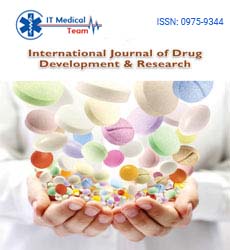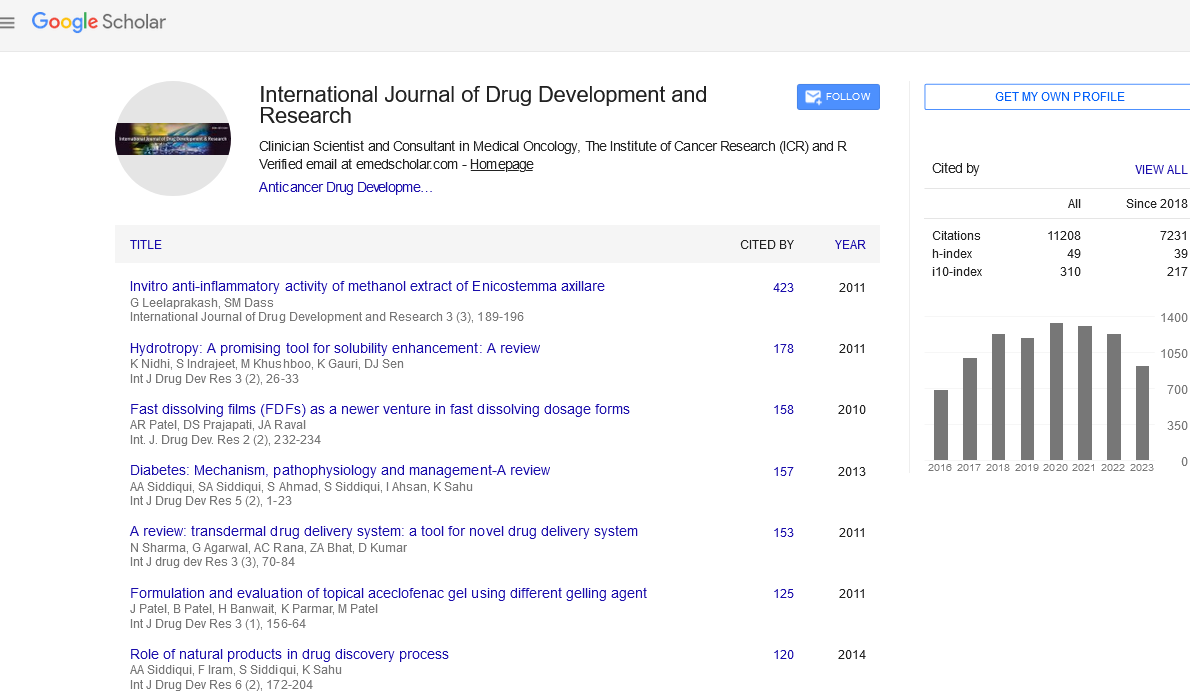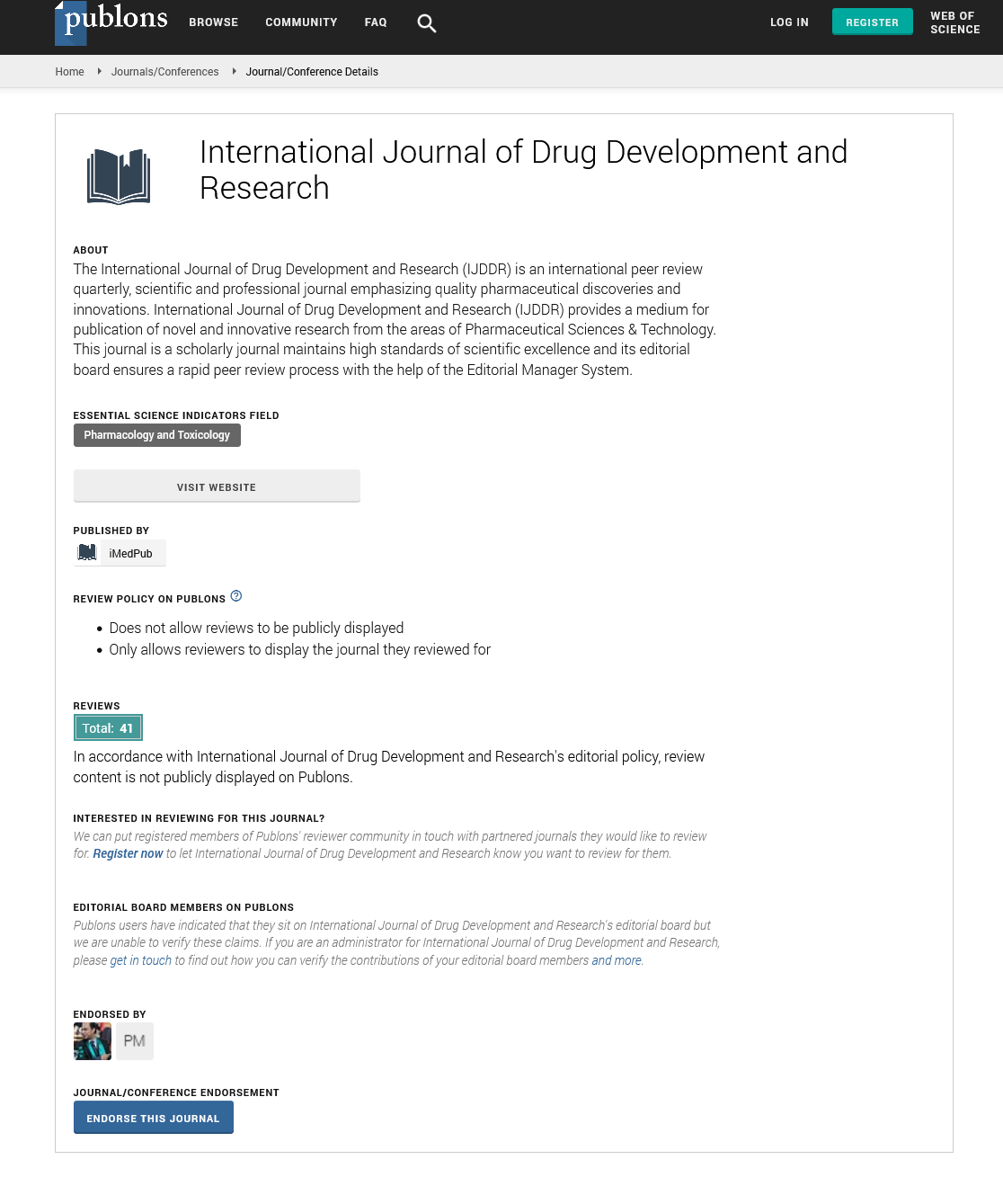Opinion - (2023) Volume 15, Issue 6
Exploring the future scope of translational medicine: Bridging the gap between bench and bedside
Huk Le*
Department of Biotechnology, Yeungnam University, Gyeongsan, South Korea
*Correspondence:
Huk Le, Department of Biotechnology, Yeungnam University, Gyeongsan,
South Korea,
Email:
Received: 02-Nov-2023, Manuscript No. ijddr-23-14317;
Editor assigned: 06-Nov-2023, Pre QC No. P-14317;
Reviewed: 21-Nov-2023, QC No. Q-14317;
Revised: 28-Nov-2023, Manuscript No. R-14317;
Published:
08-Dec-2023
Introduction
Translational medicine, at its core, is a multidisciplinary
approach that aims to bridge the gap between scientific
discoveries and their application in clinical practice. This
dynamic field involves the seamless integration of basic
research, clinical trials, and patient care to accelerate the
development of new diagnostics, therapies, and medical
technologies. As we stand on the precipice of technological
advancements and scientific breakthroughs, the future
scope of translational medicine holds tremendous promise.
In this article, we will delve into the evolving landscape
of translational medicine, highlighting key areas of growth
and innovation.
Description
Personalized medicine and precision
therapeutics
One of the most exciting prospects in translational
medicine is the move towards personalized medicine and
precision therapeutics. Advances in genomics, proteomics,
and other omics technologies have paved the way for a
deeper understanding of individual variability in disease
susceptibility and treatment response. In the future,
clinicians may be able to tailor medical interventions based
on a patient's unique genetic makeup, allowing for more
effective and targeted treatments with fewer side effects.
Digital health and big data integration
The integration of digital health technologies and the
utilization of big data are transforming the landscape of
translational medicine. Wearable devices, health apps, and
electronic health records contribute to the generation of vast
amounts of health related data. The future of translational
medicine involves harnessing this data to gain insights
into disease patterns, treatment responses, and patient
outcomes. Machine learning algorithms can analyze these
large datasets to identify trends, predict disease progression,
and optimize treatment strategies.
Immunotherapy and advanced therapeutic
approaches
Immunotherapy has emerged as a ground-breaking
approach in cancer treatment, and its future scope
in translational medicine is exceptionally promising.
Harnessing the body's immune system to target and eliminate cancer cells has shown remarkable success in
certain cancers. As research progresses, we can anticipate
the expansion of immunotherapy into other disease areas,
including autoimmune disorders and infectious diseases.
Additionally, the development of gene and cell therapies
opens new avenues for treating genetic and degenerative
conditions.
Nanotechnology in diagnosis and treatment
The integration of nanotechnology into translational
medicine offers unprecedented opportunities for diagnosis
and treatment. Nanoparticles, nano-sensors, and nano-devices
can be engineered to target specific cells or tissues,
enabling precise drug delivery and imaging. This nanoscale
approach not only enhances the efficacy of therapeutic
interventions but also reduces side effects by minimizing
damage to healthy tissues. The future will likely see further
refinement of nanomedicine, with applications extending
beyond oncology to neurology, cardiology, and infectious
diseases.
Regenerative medicine and tissue engineering
Regenerative medicine holds immense potential for treating
degenerative diseases and injuries by stimulating the body's
natural healing processes. The field involves the use of
stem cells, biomaterials, and tissue engineering techniques
to repair or replace damaged tissues and organs. Ongoing
research in regenerative medicine aims to overcome current
limitations and facilitate the development of functional
tissues for transplantation. In the future, regenerative
therapies may become commonplace in the treatment of
conditions such as heart disease, spinal cord injuries, and
diabetes.
Global collaborations and open science
initiatives
The future of translational medicine is not confined by
geographical boundaries. Global collaborations and open
science initiatives are becoming increasingly prevalent,
fostering the sharing of knowledge, resources, and expertise.
Collaborative efforts among researchers, clinicians,
pharmaceutical companies, and regulatory bodies accelerate
the translation of discoveries into practical applications.
Open access to data and findings promotes transparency
and ensures that breakthroughs are disseminated rapidly,
benefitting patients worldwide.
Patient engagement and participatory
research
As the focus on patient-centered care intensifies, the
future of translational medicine will see increased
emphasis on patient engagement and participatory
research. Patients are becoming active partners in the
research process, providing valuable insights into their
lived experiences, treatment preferences, and quality of
life. Engaging patients in the design and conduct of
clinical trials ensures that research aligns with their needs
and priorities, ultimately leading to more relevant and
impactful outcomes.
Ethical and regulatory considerations
As translational medicine progresses, it is crucial to address
the ethical and regulatory challenges associated with
emerging technologies and innovative therapies. Striking a
balance between facilitating innovation and safeguarding
patient welfare requires ongoing dialogue and collaboration
among researchers, ethicists, policymakers, and regulatory
agencies. The future of translational medicine necessitates
the development of robust ethical frameworks and
adaptable regulations to guide the responsible advancement
of medical science.
Conclusion
In conclusion, the future scope of translational medicine is
characterized by a convergence of cutting-edge
technologies, interdisciplinary collaboration, and a patient
centric approach. From personalized medicine to
regenerative therapies, the evolving landscape promises to
revolutionize healthcare by translating scientific discoveries
into tangible benefits for patients. As we navigate this
exciting frontier, it is essential to remain vigilant about
ethical considerations and regulatory frameworks to ensure
that translational medicine continues to uphold the highest
standards of safety, efficacy, and patient well-being. The
journey from bench to bedside is an ever-evolving one, and
the future holds the promise of transformative
breakthroughs that will shape the landscape of medicine for
generations to come.






